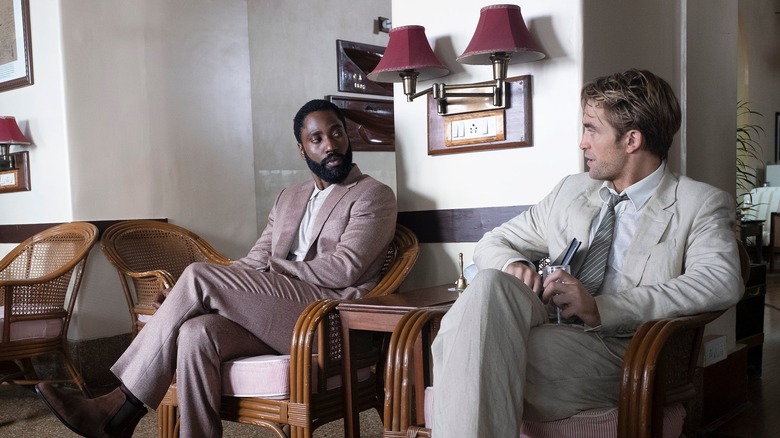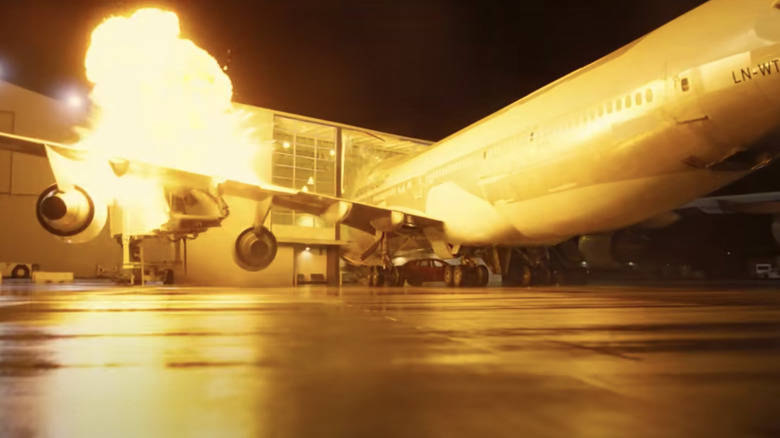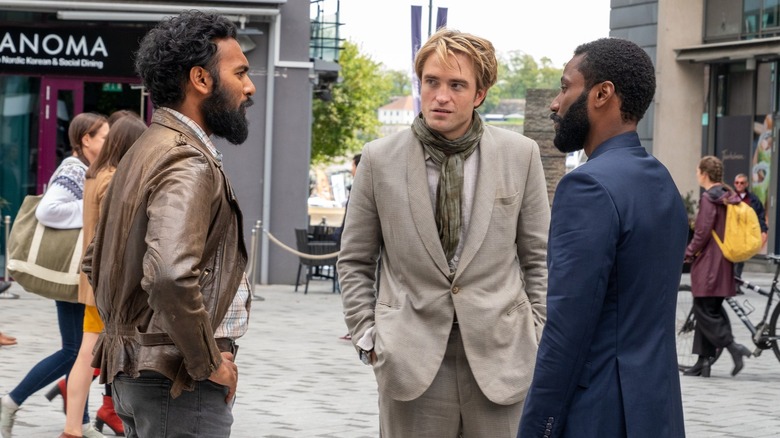The Plane Crash In Tenet Was More Real Than You Think
"Well, that part is a little dramatic." That's what Neil (Robert Pattinson) quips at the Protagonist (David K. Washington) when he reveals his plan to crash a 747-sized plane into the freeport they're breaking into. It's one of the many pieces of the puzzle that make-up Christopher Nolan's espionage-thriller "Tenet." Yet those who've seen the film know that dramatic might just be an understatement when describing the scene.
We know you're probably still scratching your head over the film's criss-crossing of inverted and non-inverted characters. Luckily, Nolan makes the phenomenon a visually stunning affair, whether it's bullets being pulled from walls or inverted car chases. Although the baffling and enthralling visuals of time-inversion are absent from the film's largest set-piece: the plane crash that Neil orchestrates about halfway through the movie. There's no CGI magic during the explosive scene — that's a real plane being driven into the building — making its filming no less climactic than the movie's actual events!
Nolan Never Intended to Crash a Real Plane
When do you decide that buying a real plane and crashing it is more efficient than using CGI? Probably around the time you're told you have a $200 million budget for the film you're making. That's how much Nolan had approved for "Tenet," but the director still initially had plans to use other methods. After all, miniatures had served him quite well in the past with "The Dark Knight" and "Interstellar." But a fateful bit of location scouting in Victorville, CA, near a plane lot changed all that in a heartbeat.
"I planned to do it using miniatures and set-piece builds and a combination of visual effects and all the rest," Nolan told Total Film, continuing:
"We started to run the numbers... It became apparent that it would actually be more efficient to buy a real plane of the real size, and perform this sequence for real in camera, rather than build miniatures or go the CG route."
We're not sure if "efficient" translates exactly to "cheaper" the way Nolan is using it. But if you can afford to buy a plane and crash it for your movie, then you buy a plane and crash it for your movie. There's a reason the scene sticks out in a film filled with mind-bending moments that strain your sensory understanding of time and physics. Nolan knew no amount of backwards moving boats, cars, or people could out-awe the sight of a very real, non-CGI plane smashing itself into the side of a building.
A Ridiculously Bold Stunt
We imagine Nolan telling Washington and Pattinson about his plans to use a real plane unfolding not much differently than Neil's pitch to the Protagonist. As the plan's fixer Mahir (Himesh Patel) points out, there is an important difference between something being bold and nuts. Fortunately Nolan enlisted actors just as daring because the film's central duo were more than game for the stunt. Washington said in an interview with Cinema Blend:
"That was a real plane, and that was a real building that they crashed that plane into. And we, cast and crew, all witnessed it. It was epic! It was incredible, we all cheered and hurrayed and hurrahed when they yelled cut after Chris felt like he got it. What you saw is really what happened – at least the night I was there."
Washington was obviously much more enthused about the spectacle of the plane explosion than his character. Then again, the Protagonist did have to deal with said plane not once, but twice. The first time while inside the building being crashed into and the second forced to run into it. But what about Pattinson AKA Neil, the in-film inceptor of the plan? According to his interview with Total Film:
"You wouldn't have thought there was any reality where you would be doing a scene where they just have an actual 747 to blow up! It's so bold to the point of ridiculousness... I remember, as we were shooting it, I was thinking, 'How many more times is this even going to be happening in a film at all?'"
Whether its dream heists, interstellar travel, or reversing time's entropy, there is a pattern of inventive sci-fi that crops up within Nolan's films. And while the illustration of these is often as dazzling as the ideas themselves, like the opening scene from "Memento" that oddly alludes to "Tenet," one thing never changes. A good old fashioned, over-the-top explosion never fails.


